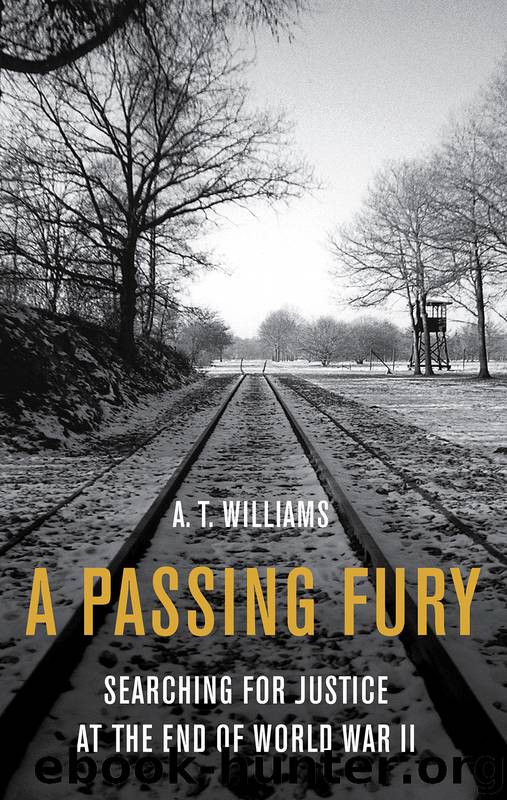A Passing Fury by A. T. Williams

Author:A. T. Williams
Language: eng
Format: epub
Publisher: Random House
10.
The cross-examination of a defendant is the moment when a trial comes alive. On the twentieth day of the Belsen proceedings, 9 October 1945, Kramer was in the witness box.
Colonel Backhouse began with one of those questions that advocates should avoid.
‘Do you believe in God?’
It was a despairing beginning, a precursor not to some existential and moral enquiry but to an accusation that the defendant had a propensity to lie on oath. Kramer’s first statement to Lt Col Genn had denied that there were gas chambers in Auschwitz, something Kramer retracted later. Now Kramer explained that he’d been bound by an oath of secrecy and this had prevented him from telling the truth about the extermination of the Jews and the mass executions. He’d felt no need to be honest when captured. He hadn’t known then that the statement would appear in his trial.
Backhouse said the statement was made on oath. If Kramer believed in God then that oath should have been sacred: that was the implication. Given all that the court had heard so far, Kramer’s ability to lie in contravention of any vow to God seemed of such minor importance as hardly warranting notice. And yet, as I found later, this was not the last time such a line of questioning would appear in concentration camp cases. As if God had anything to do with the Nazi regime.
It took a few minutes before Backhouse moved on from this irrelevant exchange. His next line of questioning related not to Auschwitz or Bergen-Belsen, but to Kramer’s time as commandant of Natzweiler-Struthof. Though not on the charge sheet, his stint there was pertinent and, as he confessed to his attorney, Kramer was sensitive to its inclusion, particularly as he’d been personally responsible for the gassing of prisoners there so that their bodies could be used for medical experiments. Were the gas chambers in Natzweiler constructed by his order? Backhouse asked.
Yes, said Kramer.
Did he deliberately gas eighty prisoners there?
Yes, on a command from Himmler. A special transport. The bodies were to be sent to Strasbourg University after the killing.
And he simply followed those orders?
The highest military authority commanded him – think what they would have done to him if he’d refused.
Did he actually force these people into the gas chambers himself?
Yes.
Yes. No equivocation. Bold, bland, blind. Read that ‘yes’ and the human condition – about which so much has been written, debated, pondered – splinters and fractures. One affirmation by a man who said he was obliged to follow his orders.
I couldn’t tell whether Colonel Backhouse thought for a moment about this ‘Yes’. Had he paused? I didn’t think so.
With some speed, Backhouse moved from Natzweiler to Auschwitz. He asked what purpose the gas chambers served there.
Kramer didn’t know.
Wasn’t it part of a doctrine of the Nazi party, a party Kramer had joined, to exterminate the Jews?
Kramer didn’t know: he didn’t talk about such things.
Wasn’t it part of policy to exterminate all intelligent Poles?
He didn’t know.
How many people were killed in those chambers?
He didn’t know.
Download
This site does not store any files on its server. We only index and link to content provided by other sites. Please contact the content providers to delete copyright contents if any and email us, we'll remove relevant links or contents immediately.
| Africa | Americas |
| Arctic & Antarctica | Asia |
| Australia & Oceania | Europe |
| Middle East | Russia |
| United States | World |
| Ancient Civilizations | Military |
| Historical Study & Educational Resources |
The Radium Girls by Kate Moore(10907)
The Templars by Dan Jones(4189)
100 Deadly Skills by Clint Emerson(4076)
Rise and Kill First by Ronen Bergman(4012)
The Doomsday Machine by Daniel Ellsberg(3730)
The Rape of Nanking by Iris Chang(3516)
Killing England by Bill O'Reilly(3455)
Hitler in Los Angeles by Steven J. Ross(3437)
Stalin by Stephen Kotkin(3086)
12 Strong by Doug Stanton(3057)
Hitler's Monsters by Eric Kurlander(2731)
Darkest Hour by Anthony McCarten(2645)
Blood and Sand by Alex Von Tunzelmann(2608)
The Art of War Visualized by Jessica Hagy(2412)
Hitler's Flying Saucers: A Guide to German Flying Discs of the Second World War by Stevens Henry(2293)
The Code Book by Simon Singh(2209)
The Second World Wars by Victor Davis Hanson(2134)
Babylon's Ark by Lawrence Anthony(2070)
Tobruk by Peter Fitzsimons(2060)
